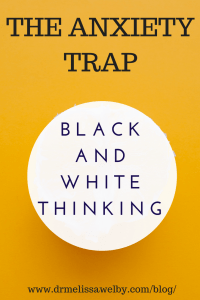Do you get stuck in black and white thinking and it is hard for you to see options other than all or nothing? Does rigid thinking cause you to live in the extremes where it is “my way or the highway”? Black and white thinking in relationships is generally not a benefit that brings harmony. Are you aware of the downsides of dichotomous thinking in your life? Read this post to learn how to stop black and white thinking.
Dichotomous thinking:
Black and white thinking is dichotomous. Dichotomous means something is divided into 2 distinct and opposing parts.
Examples of dichotomous thinking:
- happy-sad
- good-bad
- beautiful-ugly
- success-failure
- fat-skinny
- never-always
Rigid thinking:
Rigid thinking can cause stress and conflict. Without flexibility of thought, people are less adaptable to the unpredictability of life in general. They may feel everything needs to be done in a certain way and miss out on alternative ways to view the world and achieve results.
Black and white thinking hinders growth and keeps people feeling stuck living in absolutes.
Black and white thinking in relationships:
In relationships, people who think in extremes are less likely to compromise or cooperate to meet common interests. This can make someone seem inflexible and judgemental which can definitely stress a relationship.
Life is a series of negotiations:
Life is a series of negotiations that often requires seeing a different person’s point of view and even compromising in order to reach a goal. Being flexible is essential for satisfying balance in relationships where there can be equal give-and-take.
Dichotomous thinking harms mental health and well-being:
Black and white thinking increases disappointment, frustration, anger, and anxiety in life. No-one can be all-good or all-bad or do everything perfectly.
Life isn’t all-or-nothing and most decisions, events, and relationships fall somewhere in the middle. When something doesn’t go as planned, rigid people forget that the alternative result may turn out for the best.
Anxiety and rigid thinking:
Anxious people get tricked into rigid thinking because it gives a false sense of security that they have control over life’s uncertainties. Dichotomous thinking falsely simplifies options but it isn’t an accurate representation of the complexities of life.
Instead of reducing anxiety, thoughts are viewed through a distorted lens that makes people more anxious. If good or bad are the only options available that can put a lot of pressure on a person to be perfect! Using that logic, if I make a mistake then I am not good and therefore I am bad. If I am not a success than I am a failure. Ouch!
Looking for other tips on how to tackle anxiety? Read these posts!
- Do what you are afraid of! Stop letting anxiety control you
- 5 Ways to Stop a Panic Attack
- The Best Resource for Anxiety
Wondering how to stop black and white thinking?
Recognize rigid thinking:
If you are wondering how to stop black and white thinking the most important step is to recognize inflexible and rigid thinking. It’s difficult to make any progress without identifying and catching yourself when you are thinking in extremes.
Let trusted family or friends know you are working to identify these thinking traps and you may need some help recognizing it.
A therapist can be invaluable to help you identify these thinking patterns (called cognitive distortions).
If you would like to read more about cognitive distortions this article explains 10 common cognitive distortions.
Stop and challenge the dichotomous thinking:
Once you recognize a rigid thought you can stop and challenge the assumptions. Sometimes it is helpful to draw out a continuum and place your thoughts on it. Since rigid thoughts are on one end of the spectrum or the other, try to fill in ideas for what could exist in between the ends. What are other possibilities for the situation? Train yourself to see other options.
Remember that everything in life is a negotiation and look for balance in any situation. No-one and no situation is all good or all bad.
When people learn to live in the gray zone they will find more happiness. There is a huge relief once rigid expectations are let go of allowing for more openness to a range of life’s possibilities. Disappointments and anger will shift and letting go can happen. Anxiety will be reduced and healing can happen. Give it a try! Start to identify when you may be getting stuck in dichotomous thinking and challenge yourself to begin to see the middle ground. It is there if you look.
What are your examples of black and white thinking? Has anything helped you see the middle ground easier?
Don’t miss new blogs! Have them delivered right to your inbox by signing up to follow the blog. Enter your email in the box on the right-hand side of the page.
Looking for additional mental health resources? Visit the Mental Health Bookstore to see a list of doctor-recommended books on many different health topics.
Here are 4 books that will help you conquer anxiety and depression:
[amazon_link asins=’1462520421,0452281326,1608822087,0195311353′ template=’ProductGrid’ store=’drmelissawelb-20′ marketplace=’US’ link_id=’72024ff0-3f5e-11e8-b9ae-2dee7f38285f’]


